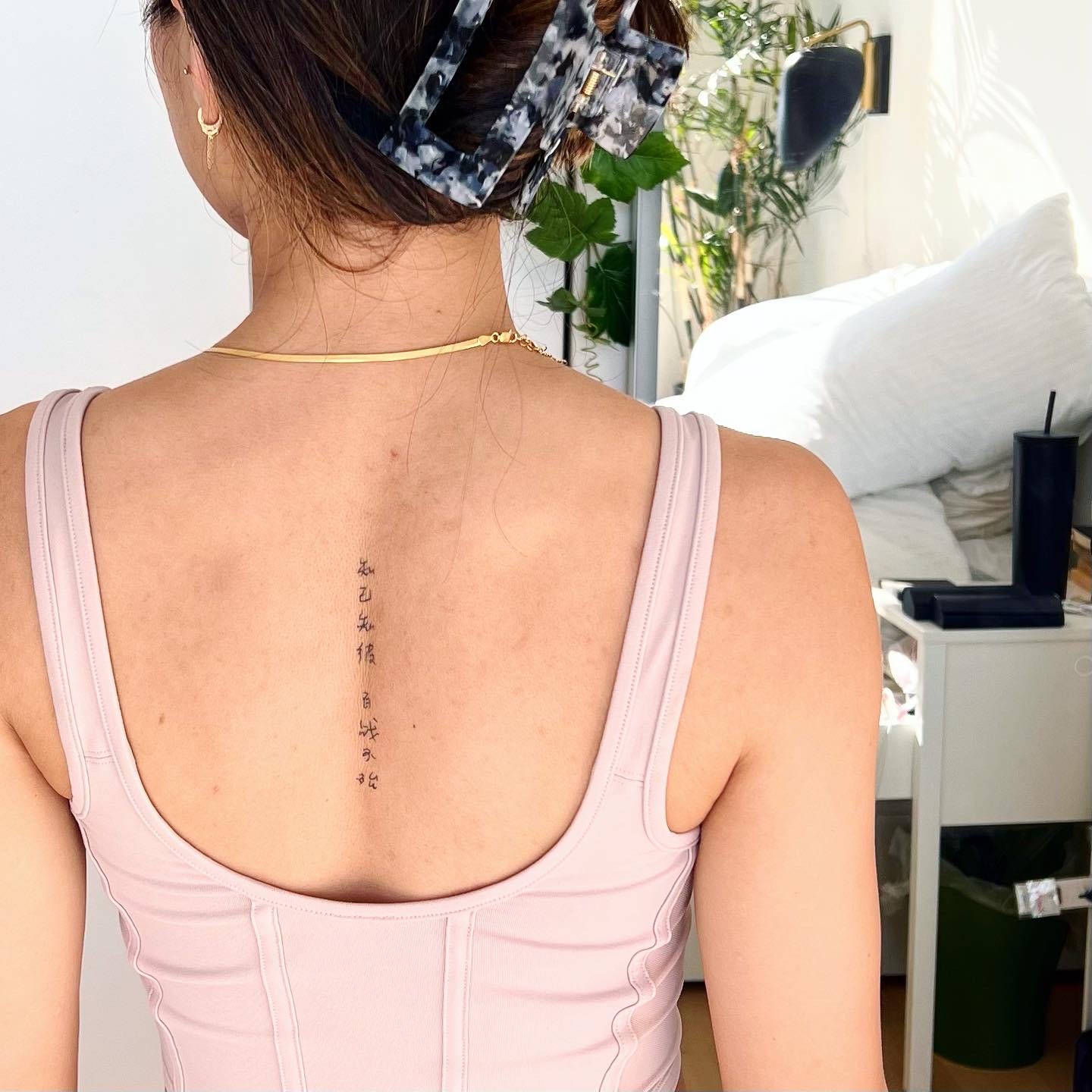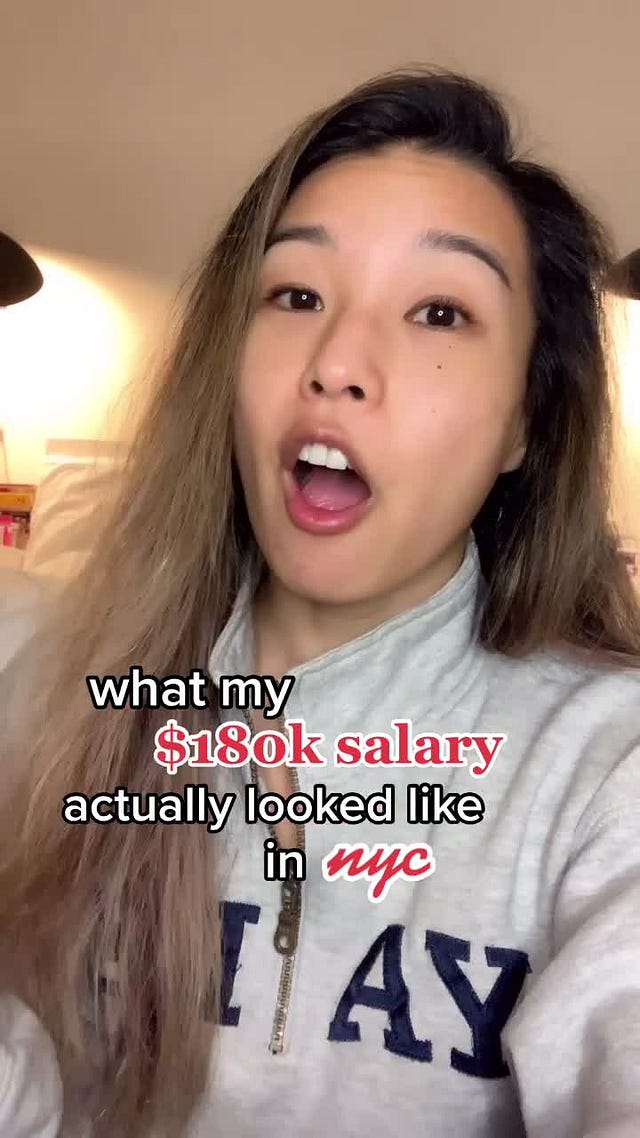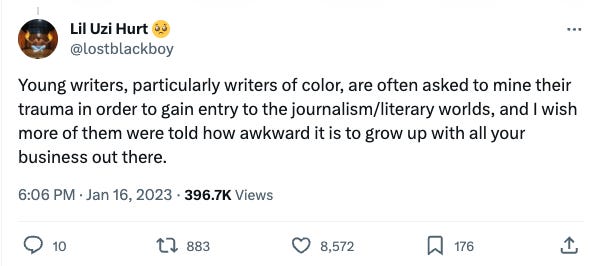If you watched or listened to this episode, you can stop here! This written portion will go over much of the same substance. You can just claim your welcome offer (40% cheaper than subscribing monthly!!):
But if you prefer text over audio/video content (no shame—I am the same!), continue reading to learn more about the future of this Substack and why I’m finally enabling paid subscriptions.
If you’re new here (as many of you are—welcome!!), this post will also give you an idea of what debrief is all about and where it’s going. I’m so glad to have you here!!

For the longest time, I felt a lot of shame around money for creative work. As a lawyer working under the auspices of large firms, writing articles and client alerts are non-billable tasks, which means that while I spent many hours researching and writing for external audiences, those hours did not count towards my annual billable hours expectation. In other words, writing was work but not work-work, y’know?
On top of that, a lot of my videos and writing are informational, educational, or otherwise trying to provoke thought—work that should be free, in my perfect world, and accessible to all. I know that I could paywall college/law school tips and early career advice for networking and politicking, but the thought of doing so makes me queasy. That information is most valuable to people who cannot afford to pay for it, and I firmly believe in the internet’s potential to democratize knowledge and level the playing field. (Isn’t it silly that important news and information are often paywalled while thousands of creators mine sensitive parts of their personal lives for free? Don’t you find that a bit dystopic?)
Last week, when I became a Substack featured publication (yes, really!!), I began thinking about the future of debrief. I thought long and hard about what I liked sharing in my early days of making TikToks during the height of the pandemic, all of the negative comments and Reddit/Fishbowl/etc. threads that have since fenced in my creative joy, and all the steps I’m currently taking to reclaim that joy. (Partly because I’ve found that doing so will also help me write my book. Creativity cannot thrive when the mind is yoked. Write drunk, edit sober, right?)
One of the videos I most enjoyed sharing when I first hit Post but now absolutely hate that I shared is my overview of what a $180,000 paycheck as a first-year biglaw associate looked like:
I truly believed at the time I received my offer letter that a $180,000 salary meant I would be able to BALL OUT—buy luxury handbags every month, take fancy vacations, live a Gossip Girl existence. Was that dumb of me? Absolutely.
But as a student who had never had to think before about retirement savings, health savings accounts, or student loan repayments—which I recognize is an enormous privilege—I was surprised by how much “being a responsible adult” ate into that amount. And I’m not alone. A 2020 American Bar Association survey found that more than 80 percent of survey respondents “indicated student debt had disrupted the trajectory of their career or personal life, causing them to weigh salary more heavily in their job selection or put off home purchases, marriage, children, or vacations.” This was something that I wanted to shed light on—not to discourage people from going to law school, but to bring to the fore why one’s motivation for going to law school and where one goes to law school matters.
And I was glad I did. At first. Viewers thanked me for prompting them to take a harder look at their life and career plans. But once a video exceeds one million views, it’s always a miserable experience. People called me dumb. (I know I was.) Others accused me of lying because I didn’t talk about automatic deposits into retirement or health savings accounts. (Which hadn’t even occurred to me; my parents had taught me to act as if that money didn’t exist.) And a minority—but still a very hurtful minority—called me awful names and sent me awful emails.
I felt wretched. I would have shared my salary breakdown with anyone who asked in offline life—biglaw salaries are public, I find personal finance mystifying so imagine others do too, Chinese people often share salaries/rent/money information with each other, etc.—but I was not prepared for what sharing at scale entailed. I left the video up, because I stood (and still stand) by what I said, but I make a concerted effort to ignore all comments on the video now. It’s a cesspool.
I wanted to never again make a video about my finances—no more what-I-spend-in-a-days, kill the student loan repayment progress updates, not even mentioning purchases I made—but at the same time, I felt pulled to continue making such content. A suggested Google search of my name brings up “Cece Xie husband,” while TikTok surfaces “cece xie divorce” as a search prompt on my videos. (I initially made a few videos about how my partner and I met but then felt icky about them and took them down.) I am exceedingly aware of what the giant maw of the unseen online audience wants to suck from me.
The almighty ~aLgOriThM~ (reflecting back the collective’s nosiness) rewards this type of personal life mining—it’s also why dating, dieting, and family content do so well—to a degree that eventually forces all creators and writers to confront a choice: lay bare your personal life for public consumption or risk irrelevance. The push to completely annihilate yourself through public consumption is immense. When Issa Rae was interviewed about the memoir she published in her mid-20s, she “immediately expressed regret about exposing so much of her personal life in a book at such an early age.”
Now, I’m no Issa Rae. (I wish!) But I also feel this push-pull with sharing, particularly when the things I share straddle the line between informational and personal. I love using storytelling as a vehicle to convey information. Sure, I could just tell you the general abstract framework for a cognitive behavioral therapy (CBT) technique that I’ve been using—but it’s more effective if I show you using an example from my own life.
So I’m turning on paid subscriptions so I can share a little more freely with you. I want to talk frankly about navigating the financial transition from a highly-paid, consistent W-2 income to the peaks and valleys of a writing/creative 1099 income. I want to show you what CBT and internal family systems (IFS) therapy exercises I’ve been doing to help me mentally navigate this career transition. Mostly, I want to be more in conversation with you instead of presentation to you. While keeping out the people who really, really hate me.
Nascent essay ideas, details about my writing schedule and processes, articles I’ve been nonstop texting friends about, raw video updates and voice memos—these are all things that I want to share but have actively stopped myself from doing because of the looming specter of complete personal annihilation through public consumption. The algorithm has already taken so much of me away from myself. These ideas are my newborn kittens; if they’re not handled with due care, they’ll never see the light of day.
If you’re interested in these topics, if you’d like to enter the inner sanctum, or if you find my work as valuable as a matcha latte every month (which is quite valuable!), consider becoming a paid subscriber. Paid subscribers help ensure that my informational content on Substack and all other platforms remains freely available to all. And for one week only, I’m offering 28% off of annual subscriptions (which comes out to 40% cheaper than subscribing monthly!):
Please know, though, that having you here and being able to be in conversation with you is the most important thing to me. I have exciting plans for debrief, and I want you to be a part of it. If you are a student without disposable income, un- or under-employed, or a minimum-wage worker, just email me or fill out this form and I’ll comp you a free subscription, no questions asked. If you’d like to donate one of these subscriptions, you can do so here.
As always, thank you for reading debrief. I am so grateful to have you here. My first paid post—an overview of lifestyle and financial changes I’ve made since making the jump from biglaw to writing—will be available tomorrow. I’ll see you then! ◆


















Share this post